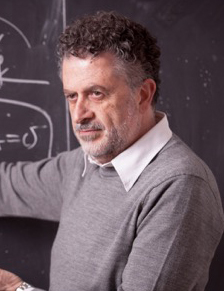GRAN SASSO SCIENCE INSTITUTE: THE INTERNATIONAL PHD SCHOOL PREPARES ITS THIRD ACADEMIC YEAR
Interview with Eugenio Coccia, Director of the Gran Sasso Science Institute (GSSI), Professor at the Tor Vergata University of Rome, experimental physicist in the astroparticle research field.

Founded in 2013 in L'Aquila, the Gran Sasso Science Institute (GSSI) is an international PhD school and a research and higher education centre. The GSSI has the objective of training highly qualified human resources, integrating education and research in a lively and interdisciplinary environment promoting a liaison between research and business. The PhD programmes, launched in the 2013-2014 academic year, are in the scientific fields of physics, mathematics, computer science and social sciences for innovation and spatial development management.
Professor Coccia, recruitment of PhD students for the third academic year of the GSSI opened a few weeks ago. It is a rather important event, also because it precedes the ANVUR (National Agency for the Evaluation of the University and Research System) evaluation planned for the end of the year.
What is your assessment of the first two years of activities?
I would say that the assessment is very positive. Together with the leading-edge professors and researchers that we have managed to involve, we have put together a modern and interdisciplinary teaching offer and research programme, immediately attracting a large number of students. In the first two years, we have had over 1,000 applications from all over the world, with a total of 80 students selected, of which about 50% from abroad. I am speaking of young graduates from the best Italian and foreign universities. Moreover, the relationship with the city, consolidated by the many cultural initiatives and study and debate opportunities, is excellent. I don't think I am exaggerating if I say that we are seen as a reason of hope for the rebirth of L'Aquila.
What was behind the creation of a centre of scientific excellence in L'Aquila?
The presence of the GSSI in L'Aquila was made possible, against the backdrop of the tragic earthquake of 2009, by the impetus of the OECD (Organisation for Economic Cooperation and Development), the commitment of the INFN and the willingness of the Abruzzo Region and the National Government. The OECD recognised the important role of a new institute such as the GSSI in order to relaunch L'Aquila, also thanks to the contribution of the specialised expertise and facilities already present in the area, such as the Gran Sasso National Laboratories.
What is the current and future link with the INFN, the body responsible for activating the project?
The link with the INFN is very strong, not only due to its role as activator. The tradition of scientific excellence of the INFN and its ability to train young people in an international environment have been fundamental to the credibility of the GSSI project. I believe that when the GSSI will be a new independent institution, the area of physics and the astro-particle PhD programme will be organised and managed jointly with the INFN.
What characterises the GSSI as an international centre?
I would like to mention two elements: the synergy with a large world-class research infrastructure, such as the INFN Gran Sasso Laboratories, and the highly interdisciplinary character resulting from its sponsorship by the OECD. The GSSI is not the result of local petitions or affiliation with other universities, two situations in which one can be subjected to particular interests, but of a modern vision of the role of culture and research for the development of a city and a region.
Is it already possible to assess the impact of this new population of international and interdisciplinary researchers on the quality of basic research and on regional development and innovation at the local and national level? What are the expectations for the near future?
It's too early for an impact assessment. Certainly, we are attracting to L'Aquila students and researchers of quality, otherwise destined for other foreign organizations. We are actively committed to designing the future of L'Aquila, promoting studies and research that have as their central themes the quality of life and opportunities for economic development of the city. Moreover, one should also take into account that the very presence of the GSSI is a factor in the revitalisation of the economic and social fabric of this historic centre. In this regard, it must be underlined that the majority of the funds necessary for its operation are transformed into local demand for goods and services.
MARCH 2015



